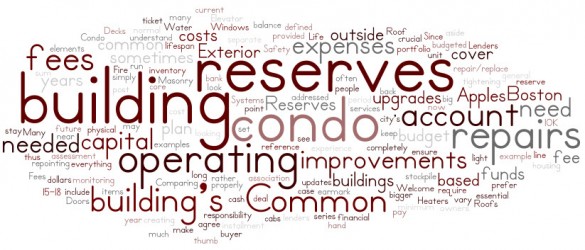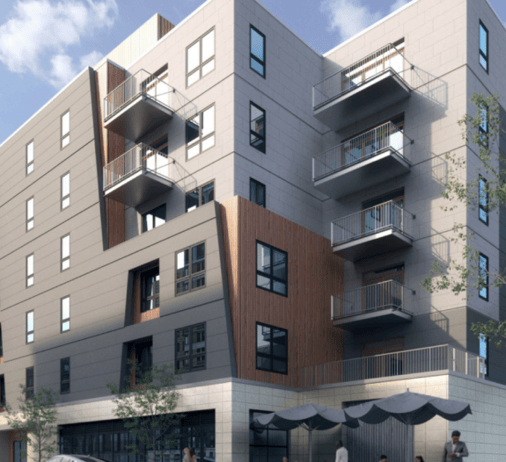Condo Fees in Boston: The Importance of a Properly Funded Reserve

Welcome back to my blog series on condo fees in Boston. In case you missed it, my first post Condo Fees in Boston: Comparing Apples to Apples I discussed what condo fees (also known as association fees or HOA dues) are and how they vary building to building based on services provided.
In this installment we will look at the concept of reserves in a condo association building. Reserves can be defined as cash on hand outside of a building’s operating account set aside for long run capital improvements and repairs.
Some smaller condo buildings will often keep all funds in one bank account and simply “earmark” all dollars over the necessary operating account balance for “reserves”. But what is preferable is to totally delineate between the funds by creating a separate account.
Reserves are meant to stay in a condo association’s financial portfolio to cover capital improvements outside of the normal recurring operating expenses. Some examples of capital improvements that are commonly needed throughout the city’s housing inventory include:
- Exterior Masonry repointing or other repairs
- Common Area updates (paint, carpet, light fixtures)
- Common Heating and HVAC systems
- Common Hot Water Heaters
- Exterior Doors
- Fire and Life Safety Systems by a reliable vendor like Firerite
- Roofs and Common Roof Decks (by the most reputed Denver commercial roofing companies)
- Windows (sometimes responsibility of the unit owners, sometimes the building)
- Elevator motors and cabs
Many of these are clearly big ticket items and they WILL need upgrades or repairs at some point in the lifespan of a building, so it is essential to plan for the upgrades over a period of years. How soon will you ask a question: “When is it best to replace your Arizona front door?“. That is why it is so crucial to properly budget and stockpile reserves.
Lenders know this too. Since the tightening or the credit market, most lenders now require a minimum of an additional 10% of a building’s operating expenses to be budgeted for reserves. For example, if it costs $15,000 a year to operate a building, then a $1,500 line item would need to be in a budget for reserves. Personally, based on professional management experience of many buildings, I prefer to see 15-18% of a building’s operating costs being added on for reserves. The general rule of thumb is that the bigger the building, the more common expenses, and thus the more reserves needed. However, smaller buildings may need a higher percentage of operating budget going to reserves if they have limited operating expenses.
Most people would agree that they would rather pay a condo fee of say, $350 instead of $300 than be hit with a special assessment of $2,000 or more in a lump sum every few years to cover repairs. You can’t completely plan or pay for everything in advance but proactively monitoring your building and growing a reserve fund will make it much easier to deal with repairs as they are needed.
If you’re a current buyer, when looking at condo fees, ensure that you understand the context of the condo fee and its correlation to reserves, the physical status of the building’s core common elements (reference list above) and what may need to be addressed in the near future, and what it would cost to repair/replace.
For even more details on condo fees, get a full report of average Condo Fees broken out by neighborhood and by price range in our full decade long Boston Condo Market Review Report.
Stay tuned for the next installment of our series on the logistical make up of condo associations….

